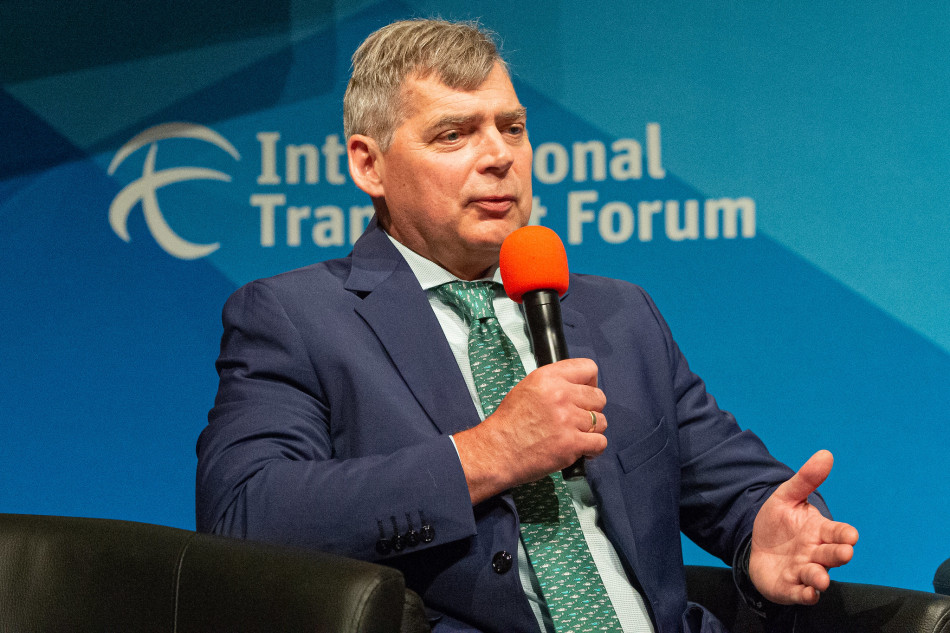MOBILITY FOR ALL: FIA DISCUSSES HOW TO BUILD A MORE ACCESSIBLE SUSTAINABLE MOBILITY FUTURE AT ITF 2023 SUMMIT
MOBILITY FOR ALL: FIA DISCUSSES HOW TO BUILD A MORE ACCESSIBLE SUSTAINABLE MOBILITY FUTURE AT ITF 2023 SUMMIT
At the 2023 edition of the International Transport Forum (ITF) Summit focused on “transport enabling sustainable economies”, the FIA advocated for a sustainable mobility transition that leaves no one behind and takes into account the wide array of users’ needs.

Held this year from 23-26 May in Leipzig, Germany, the Annual Summit of the International Transport Forum is the world’s largest gathering of transport ministers and the premier global transport policy event.
FIA Deputy President for Automobile Mobility and Tourism Tim Shearman was invited to take part in a panel discussion on “How to capture accessibility benefits in transport planning”, along with Ann Frye, Director of Ann Frye Ltd, Heather Thompson, CEO of the Institute for Transportation and Development Policy (ITDP) and Daniel Eui-Seok Kim, CEO of Autocrypt.
Tim Shearman started by highlighting the fact that the FIA and its network of Members representing over 80 million road users and their families are committed to being the global voice promoting ‘Mobility for all’.
“We have automobile in our name but we know our Members don’t just use the automobile. They ride their bikes, they take rapid transit, they walk, we need to have safe, secure mobility for all those people. We want to ensure that no one is left behind, whether they be young, elderly or disabled. We want all our Members and all the populations to have access to safe, affordable transportation and mobility.”
He explained that we should look at the big picture when talking about accessibility as it encompasses many dimensions. Increasing access relies on putting into place measures and standards to make transport adapted to the needs of all disabled users but it also requires offering more choice, social inclusion and higher convenience for all vulnerable user groups – whether these are defined by a physical or mental disability, a social criterion or a geographical area.
At the heart of this challenge is the notion of affordability. “Cost of course is probably one of the primary concerns about getting people equal access to mobility,” said Shearman. He then mentioned several projects led by FIA Members that are looking at accessibility and the cost associated with it.
As a concrete example, the Reial Automòbil Club de Catalunya (RACC) has developed CityTrips, a Mobility as a Service application gathering all mobility and related value‑added services to help users quickly find the most cost-effective available transport solution.
Other Clubs are also investigating new mobility solutions. The Koninklijke Nederlandse Toeristenbond (ANWB) working with PostNL has been testing hundreds of drone flights as part of its Medical Drone Service with the aim to help improve access to medical services and contribute to reducing costs.
Shearman also explained that his Club, the Canadian Automobile Association (CAA) just carried out the largest-ever survey of Canadian Electric vehicles’ drivers. Conducted with the support of the FIA Mobility Sustainable Programme funded by the FIA Foundation, the survey offers unprecedented insights on the EVs users’ needs that were widely publicised to advocate for better policies and help the government make evidence-based decisions.
Consultation is necessary to understand the needs of all mobility users and Shearman highlighted how better representation and diversity in decision-making bodies both in the public and private sectors can help adopt improved and adapted solutions. To ensure it takes into account all its Members, Shearman explained that the FIA Mobility pillar is organised around four regions: “We have outreach to each of those four regions. So at least we get a bit more granularity in the information we get. And of course, within those regions, we have multiple Clubs,” he said. He underlined that the FIA, because it brings together such a strong network of national Members, plays an important role in ensuring the voice of the users is heard to drive positive change.
Tim Shearman explained that improving decision-making, affordability and accessibility also requires more data. Having access to accurate data in real time and in an appropriate format, is key for users in general, and more particularly users with special needs, to better prepare and have a safer and smoother journey. As an example of a useful tool relying on data, he mentioned the FIA Disabled Motoring Website launched in collaboration with the International Transport Forum and FIA Members that aims to give access to information on facilities and options for people with disabilities travelling by car in different countries around the world.
A change of mindset is needed to improve infrastructure to enable safer multimodality and increased data collection. “We need to convince the decision-makers that these are investments that we are making, they are not costs. I mean, if you have a more safe and affordable transportation network for all users, it’s going to make everything better. (…) If you think more long-term and invest in mobility, I think you will find the long-term cost will be lower because it will be more efficient, safer, more accessible,” Tim Shearman said.
Another important element of the discussion was the link between accessibility and sustainability. Shearman explained that increased access is essential to make mobility more sustainable. Once again, he insisted on the fact that there is no-one-size-fits-all solution. “We have been focusing on things like EVs and modern forms of transportation but that’s not the whole world,” he declared. While smart mobility solutions have enormous potential, their availability is limited in many parts of the world, and their standards may vary. It is crucial to seek cost-effective solutions that don’t restrain freedom of choice.
Tim Shearman also underlined that the difference of standards and the exportation of poor quality used vehicles to low-and-middle-income countries should be taken into consideration in our efforts to make the global vehicle fleet cleaner. A reality he has witnessed when visiting the Allgemeiner Deutscher Automobil-Club e.V. (ADAC) Test and Technical centre in Germany where the same models of cars destined to countries outside the EU didn’t get the same results in the pollution control testings as the one sold in the EU. He called for more action to be taken to improve regulations as an immediate solution to tackle pollution.

Watch Tim Shearman’s interview at the ITF:
Watch the full session:

